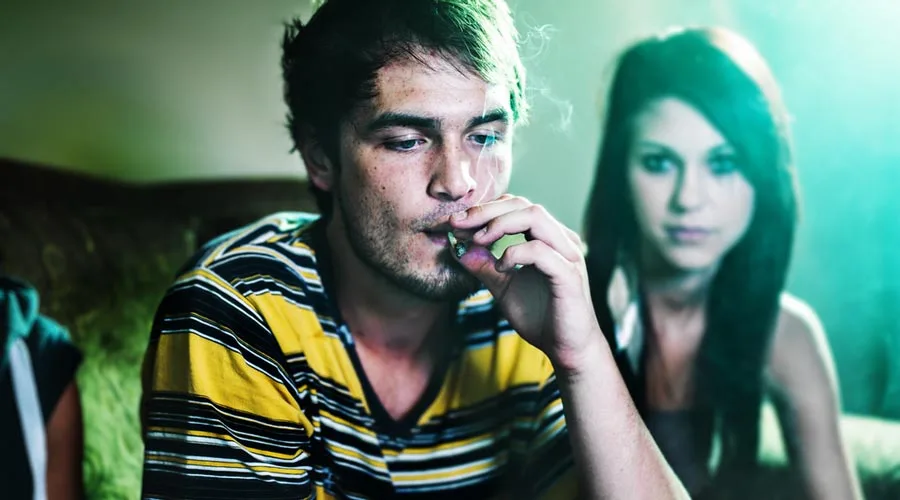Get Effective Treatment for Cannabis Use Disorder at South Shores Detox and Recovery in California
In many areas across the United States, marijuana is legal. Like with alcohol abuse, this does not mean that people cannot get addicted to marijuana. When you live with Cannabis Use Disorder, the diagnostic term for marijuana addiction, it can impact your life seriously. Still, it can be tough to identify marijuana abuse or admit that you have a problem.
Similar to many other drugs, the THC in marijuana stimulates the neurons in the reward system of your brain and signals the release of dopamine, a neurotransmitter that gives you feelings of pleasure and satisfaction. This release of dopamine is said to account for marijuana’s addictive properties.
The reality is that marijuana addiction can interfere with interpersonal relationships, obligations such as work, school, and family life, and personal well-being. Abusing marijuana can also lead to an increased risk of accidents or injury, financial problems, and other consequences.
If this sounds like what you’re going through, or if cannabis use has caused other problems in your life, marijuana addiction treatment can help. South Shores Detox and Recovery is an ideal solution for those seeking marijuana rehab in California.
For many people, the question is: How do you know if you have an addiction to marijuana? Once you know that you have a problem, how do you find a marijuana rehab center near you?
First, let’s discuss the signs, symptoms, and effects of marijuana abuse. Then, we’ll talk about what to expect in our programs and what makes South Shores Detox and Recovery a leading provider of cannabis abuse treatment in California.
How to Identify Marijuana Abuse: Signs, Symptoms, and Effects
The Centers for Disease Control (CDC) asserts that approximately 3 in 10 people who engage in marijuana use have Cannabis Use Disorder. Knowing the signs and symptoms of marijuana addiction can help you detect Cannabis Use Disorder in yourself or someone else in your life.
Here are some signs of Cannabis Use Disorder to look out for:
- Using marijuana even though it causes problems at work, school, or in your interpersonal relationships.
- Experiencing withdrawal symptoms, including psychological withdrawal symptoms, when you stop using marijuana.
- Using marijuana in situations where it’s dangerous to do so (e.g., when operating a motor vehicle).
- Needing more marijuana than before to achieve the desired “high” (increased tolerance).
- Being unable to stop or decrease marijuana use despite attempts to do so.
- Continuing to use marijuana despite physical or mental health problems.
- Loss of interest in important activities due to marijuana use.
- Using higher amounts of marijuana than intended.
- Craving marijuana.
The Substance Abuse and Mental Health Services Administration (SAMHSA)’s 2022 National Survey on Drug Abuse and Health (NSDUH) found that 22% of people aged 12+ used marijuana in the past year in the United States. This makes cannabis and its derivatives the most frequently used illicit drug in the US.
What are the Consequences of Marijuana Abuse?
When you use marijuana, it slows the central nervous system. Marijuana use is linked to a number of different health risks. People who use marijuana regularly (long-term marijuana abuse) or who engage in continued abuse are at a higher likelihood of many of these concerns in addition to addiction.
If you are pregnant or may become pregnant, marijuana abuse can affect the baby’s development. Here are some other potential risks and consequences.
- An increased risk of poor educational, relationship, and career outcomes.
- Negative long-term effects on the brain (poor brain health).
- Slowed reaction time and body movements.
- Problems with the law.
- Financial problems.
- Reduced life satisfaction.
- Impaired judgment.
- Memory problems.
- Mood changes.
Consequences related to lung health generally impact people who smoke the drug, but those who use marijuana face the risks listed above regardless of how the drug is consumed. Burning mouth or throat, a phlegmy cough, and a higher risk of bronchitis can also come from smoking flowers of the Cannabis sativa plant. Despite the effects of cannabis on a person’s life, lifelong recovery from a cannabis use disorder is possible.
Getting Marijuana Addiction Treatment at South Shores Detox and Recovery
Recovering from marijuana addiction is not only possible – it’s one of the most likely outcomes for people who seek treatment. Over time, addiction researchers have worked to pinpoint what makes treatment for drug abuse most likely to be effective. South Shores Detox and Recovery uses evidence-based approaches in our substance abuse treatment programs so that clients like you or your loved one can achieve the best possible treatment outcomes.
Here are some of the factors that make our addiction treatment center a leading choice for those who want to achieve lasting recovery from marijuana addiction.
Mental Health and Dual Diagnosis Expertise
Twelve percent of young adults and college students who use marijuana do so to manage stress. Over 60 percent of pregnant individuals who smoke marijuana or otherwise consume the drug primarily to manage stress, depression, or anxiety. With this in mind, it’s no surprise that a significant amount of people who abuse marijuana have a co-occurring mental health condition.
At South Shores Detox and Recovery, clients in cannabis abuse recovery learn coping skills, how to identify triggers, and address underlying factors that play a role in their addiction, including co-occurring mental health disorders. If other conditions, like insomnia, play a role in marijuana addiction, South Shores can help.
A Full Continuum of Care
Everyone seeking treatment for substance use disorders and mental health has different needs. Here are the addiction treatment options available to those seeking treatment for marijuana or other substances at South Shores Detox and Recovery.
- Medical Detoxification: Not everyone who lives with Cannabis Use Disorder requires detox. Withdrawal symptoms can present in people with Cannabis Use Disorder when they stop using or smoking marijuana, but they are not typically dangerous. However, detox can be a helpful part of the treatment process in some cases. If you use marijuana alongside alcohol or other drugs especially, 3-10 days in detox will likely benefit you before you transition to another care level.
- Residential Treatment: Inpatient rehab programs provide 24/7 supervision from staff and allow you to focus exclusively on healing from addiction, dual diagnosis, or mental health concerns. Our residential inpatient rehab program is likely ideal for you if you have trouble refraining from using marijuana outside of treatment hours, have a co-occurring mental health concern that is challenging to manage, or if you’d otherwise benefit from around-the-clock care. Your daily inpatient schedule will consist of group therapy sessions, at least once-weekly individual therapy sessions, meals, recreation activities, and other services.
- Partial Hospitalization Program: The partial hospitalization program (PHP) at South Shores offers intensive treatment during the day but allows you to go home or return to sober living facilities at night. PHP is the most intensive variation of outpatient treatment, with a time commitment similar to that of a work or school schedule. Many of the treatment activities used in PHP are similar to those of a residential inpatient program.
- Intensive Outpatient Program: Our intensive outpatient program (IOP) has a lower time commitment than PHP, but many of the same treatment activities (e.g., group and individual therapy) are still used. Intensive outpatient treatment can be ideal for those with mild addiction or mental health symptoms. IOP also provides optimal flexibility for those who need to work or continue school while getting help for mental health and substance use.
- Alumni Program: Once you graduate from treatment at South Shores Detox and Recovery, you can stay in touch with your support system and get ongoing support through our alumni program.
We also have specialized treatment tracks and long-term rehab programs available for clients who benefit from them. Longer treatment stays are linked to better outcomes in addiction treatment research. A step-down approach to treatment can also be highly beneficial for those in addiction treatment.
With a step-down approach, you start with a higher level of care (e.g., residential rehab) and move down to a lower level of care, like intensive outpatient programming, slowly to help you transition out of treatment. South Shore’s treatment facilities offer a step-down approach to clients with all types of addiction or mental health concerns.
Evidence-Based Therapies and Treatments
Evidence-based treatments refer to treatments known to address conditions like mental health and substance abuse concerns effectively in research. Our mental health and drug abuse treatment specialists use a range of evidence-based treatments to address Cannabis Use Disorder and potential co-occurring concerns.
Therapies and treatments offered in our California marijuana addiction treatment program include but aren’t limited to the following.
- Cognitive behavioral therapy (CBT).
- Dialectical behavioral therapy (DBT).
- Family therapy sessions.
- Couples therapy.
- Trauma therapy.
- Surf therapy.
- Art therapy.
- Physical fitness.
- Nutrition support.
- Life skills training.
South Shores Detox and Recovery firmly believes in individualized care. All clients at South Shores get individualized treatment plans, regardless of the care level they’re in. Your treatment plan will detail the specific therapies you or the person in your life in need of cannabis treatment support engage in at South Shores.
Aftercare and Relapse Prevention Planning
Recovery doesn’t end when you leave treatment for cannabis addiction. Ideally, treatment centers should offer aftercare and relapse prevention planning services to help you sustain long-term recovery. South Shores Detox and Recovery places a special focus on aftercare. Before you graduate from treatment at South Shores, we’ll help you make a relapse prevention plan.
Relapse prevention plans may include but aren’t limited to individual therapy, support groups, group therapy opportunities, work and education planning, sober housing placements, and other services. Like your rehab plan, your aftercare and relapse prevention plan will be unique to you.
Seamless Admissions and Insurance Processes
The admissions process at South Shores Detox and Recovery is confidential and seamless. South Shores accepts most forms of health insurance and will verify your or your loved one’s insurance information for free. To verify your insurance for care at South Shore’s addiction and mental health treatment center, call our admissions line, commitment-free.
Our top-rated rehab center also offers cost-free intake assessments. Intake assessments help rehab centers identify your current symptom severity and get to know you and your needs. That way, we’re able to fully understand each client’s needs and help them choose a starting level of care.
Contact South Shores Detox and Recovery for Substance Abuse Treatment in California
It is possible to break free from Cannabis Use Disorder and the effects of marijuana abuse. If you’re struggling with marijuana addiction, think that you might be, or are looking for information about treatment options for someone else in your life, contact South Shores Detox and Recovery today.
We are here to help you learn more about our cannabis treatment programs or answer any questions you have about our programs.
FAQs on Marijuana Addiction and Treatment for Cannabis Use Disorders
What is the recovery rate for marijuana?
The recovery rate for Cannabis Use Disorder (CUD) is high. Although studies vary, the relapse rate for those who abuse marijuana is 6.63% over a 3.6-year recovery period, suggesting that remission is the most common outcome.
However, some risk factors lower or increase the likelihood of relapse. For example, people with untreated depression or conduct disorder are more likely to start using marijuana again.
This risk is part of why dual diagnosis treatment is so vital for people with concurrent substance abuse and mental health disorders.
What is the definition of a marijuana addict?
In simple terms, a marijuana addict is someone who continues to use marijuana even though the drug has a negative impact on their life. For example, if you experience marijuana addiction, you may continue using marijuana even if it causes health or social problems.
Usually, marijuana addiction is referred to as Cannabis Use Disorder or CUD in clinical settings. marijuana addiction is diagnosed via the criteria for CUD in the DSM (Diagnostic and Statistical Manual of Mental Disorders). Some also use the term “marijuana Use Disorder.”
What are the signs of marijuana withdrawal?
Signs of marijuana withdrawal can include but aren’t limited to irritability, changes in mood, insomnia, and loss of appetite. Our team consists of withdrawal management specialists in addition to marriage and family therapists, psychiatrists, and other professionals, who can help you navigate withdrawal if needed.
What do you say to someone who just got out of rehab?
Family members and loved ones don’t always know what to say when their loved one first comes home from an addiction treatment center. It is vital to remember that addiction is a disease. When your loved one comes home from a treatment center, simple statements like “I love you” and “I am here to support you” can be highly beneficial.
Learning about addiction can be helpful for family members and loved ones of those facing chemical dependency of any kind. This is where family therapy, education, and group therapy or a support group for loved ones of those with substance use disorders can come into play.
References
- https://www.cdc.gov/marijuana/health-effects/addiction.html
- https://www.ncbi.nlm.nih.gov/pmc/articles/PMC4338368/
- https://www.samhsa.gov/marijuana
- https://nida.nih.gov/publications/research-reports/marijuana/how-does-marijuana-produce-its-effects
- https://www.samhsa.gov/data/sites/default/files/reports/rpt42731/2022-nsduh-main-highlights.pdf





